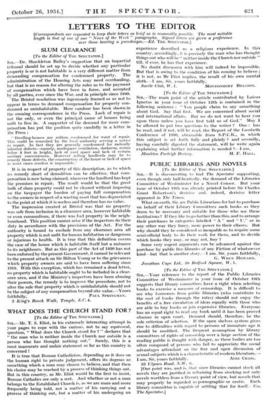LETTERS TO THE EDITOR
[Correspondents are requested to keep their letters as brief as is reasonably possible. The most suitable length is that of one of our " News of the Week " paragraphs. Signed letters are given a preference over those bearing a pseudonym—Ed. THE SPECTATOR.]
SLUM CLEARANCE
[To the Editor of THE SPECTATOR.]
SIR,—Dr. Shackleton Bailey's suggestion that an impartial tribunal should be set up to decide whether any particular property is or is not habitable is a very different matter from
demanding. compensation for condemned property. The administration of the Housing Acts may need overhauling, but that is no reason for altering the rules as to the payment of compensation which have been in force, and accepted
by all parties, ever since the War, and in principle since 1890. The Bristol resolution was ingeniously framed so as not to appear in terms to demand compensation for property con- demned as uninhabitable. More candour has been shown in the ensuing correspondence in the Press. Lack of repair is not the only, or even the principal cause of houses being unfit to live in. A supporter of the demand for more com- pensation has put the position quite candidly in a letter in the Press :
Dwelling-houses are seldom condemned for want of repair. This could be remedied by the local authority serving a notice to repair. In fact they are generally condemned for radically inherent defects—namely, inadequate ventilation, darkness, rooms below 8 feet in height, lack of yard space and lack of certain sanitary conveniences. However willing landlords may be to remedy these defects, the construction of the house or lack of space in most cases renders it impossible.-
It is in respect of property of this description, as to which no remedy short of demolition can be effective, that com- pensation is now being claimed, wherever the landlord has kept the premises in repair. The result would be that the great bulk of slum property could not be cleared without imposing on the taxpayer the burden of paying full compensation to the owners in respect of a wasting asset that has depreciated to the point at which it is useless and therefore has no value. The impression created at Bristol was that no property was safe from inclusion in a clearance area, however habitable or even commodious, if there was bad property in the neigh- bourhood. This position cannot arise if the inspectors do their duty in accordance with the provisions of the Act. For the authority is bound to exclude from any clearance area all property which is not unfit for human habitation or dangerous or injurious to health. It is true that this definition covers the case of the house which is habitable itself but a nuisance to its neighbours. But as this part of the Act of 1930 has not been enforced by the present Government, it cannot be relevant to the present attack on Sir Hilton Young or to the grievances which property owners are said to have been suffering since 1919. With this exception, which has remained a dead letter, no property which is habitable ought to be included in a clear- ance area, and if the Ministry's inspectors have been abusing their powers, the remedy is to improve the procedure, not to alter the rule that property which is uninhabitable should not be the subject of any compensation beyond site value.—Yours






















































 Previous page
Previous page